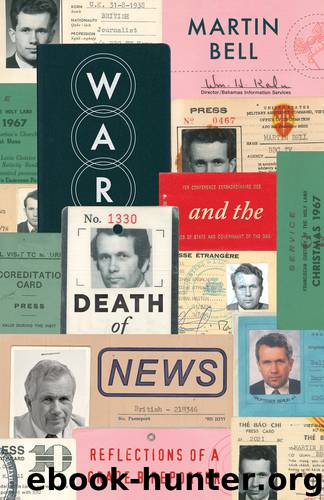War and the Death of News by Martin Bell

Author:Martin Bell
Language: eng
Format: epub
Publisher: Oneworld Publications
Published: 2017-04-18T16:00:00+00:00
I watched men desperately try to resuscitate their fallen colleagues and shake at their inability to fight with fate. I saw them weep as they learned of the death of the men they had spoken to just that morning, men they had worked with for years, drank with, played football with. Sometimes, as we took incoming fire, they hugged me but they hugged each other as well.
They spoke to me, sometimes as a journalist, sometimes as a friend, of their fears, of their grief, of their boredom, of their frustration and of their ultimate pride in what they had done in Iraq.3
She quoted a trooper wounded in a ‘friendly fire’ incident: ‘I am trained for combat. I can command my vehicle. What I have not been trained to do is look over my shoulder and see if an American is shooting at me.’ One of the soldiers asked her: ‘If you cop it, can we have your radio?’ I would even argue that women are better war reporters than men: they have more endurance and empathy.
I have been on the wrong side of enough roadblocks to know that the most effective form of censorship is a pole across the road. Television lives by its moving pictures and without them it is nothing. Open access is extremely rare. A Lebanese officer explained to me once that his army had nothing to hide and that even the most sensitive border areas were of course open to us and we could visit them whenever we wished; then he added, as if as an afterthought, that there must be no photography. The Israelis on the other side of the border were equally restrictive.
In border areas it is standard practice for security forces to arrest the journalists and empty their cameras of the film or videotape. I became expert at hiding shot rolls of tape. On one occasion, between being threatened at a roadblock and interrogated at a police station, I hid them in a hedge and retrieved them later. And in 1989 I reported from Panama: ‘The city is more tightly under army control than we can show you without getting arrested.’
In reporting the wars of the twenty-first century there was no other available choice, short of suicide, but embedding. Reporters covering the assault on ISIS-held Mosul in October and November 2016 made their arrangements with Iraqi and Kurdish Peshmerga forces and shared the dangers from roadside bombs and suicide bombers driving improvised armoured vehicles. The fighting was from house to house and street to street. The ISIS fighters had enjoyed two years in which to dig in and prepare their defences. The reporting by Orla Guerin and Ian Pannell of the BBC and John Irvine of ITV News, among others, was vivid and brave, but inevitably – like all embedded journalism – one-sided and fragmentary. If they had tried to report unilaterally, they would have been captured and executed by the city’s defenders or blown off the road by its attackers. Access came at a price.
Download
This site does not store any files on its server. We only index and link to content provided by other sites. Please contact the content providers to delete copyright contents if any and email us, we'll remove relevant links or contents immediately.
The Secret History by Donna Tartt(19003)
The Social Justice Warrior Handbook by Lisa De Pasquale(12177)
Thirteen Reasons Why by Jay Asher(8874)
This Is How You Lose Her by Junot Diaz(6857)
Weapons of Math Destruction by Cathy O'Neil(6249)
Zero to One by Peter Thiel(5768)
Beartown by Fredrik Backman(5719)
The Myth of the Strong Leader by Archie Brown(5482)
The Fire Next Time by James Baldwin(5410)
How Democracies Die by Steven Levitsky & Daniel Ziblatt(5200)
Promise Me, Dad by Joe Biden(5132)
Stone's Rules by Roger Stone(5066)
A Higher Loyalty: Truth, Lies, and Leadership by James Comey(4939)
100 Deadly Skills by Clint Emerson(4901)
Rise and Kill First by Ronen Bergman(4762)
Secrecy World by Jake Bernstein(4727)
The David Icke Guide to the Global Conspiracy (and how to end it) by David Icke(4686)
The Farm by Tom Rob Smith(4489)
The Doomsday Machine by Daniel Ellsberg(4475)
